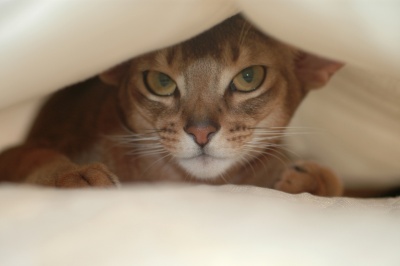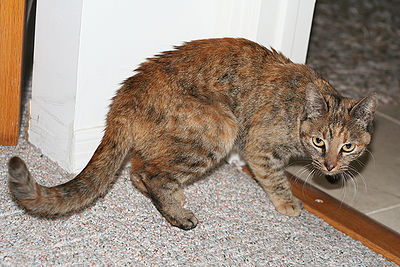
Most cats like to hide at times, and usually in some unlikely places – the clothes dryer, your mattress, under the covers, your closet, hampers, behind or under appliances (sometimes inside), boxes, paper bags and the bookcase to name a few.
Cats have very flexible bodies and are able to fit in many tight places. And there are other areas in your home that you may not realize are not cat-safe. Try to look at your home the way a cat sees it.
Cats have been known to jump into open refrigerators, open suitcases, shopping bags, under furniture, under cushions and pillows, in dresser drawers.
Before starting any appliance such as dish washer, dryer, clothes washer, oven, check to make sure your cat hasn’t made it a comfy hiding place.
When workmen come to your house, inform them you have a cat and ask them to check tool boxes and other equipment before they leave.
Cats are predators when it comes to small animals, but become prey to large animals. When cats are sick or injured, they are vulnerable to predators and will seek out hiding places for safety and protection.
There are other reasons why cats choose to hide.
Fear can be a great motivator, especially with cats that are shy or sensitive and those that are unsocialized.
When cats are on the hunt, they hide until they are ready to attack. No sense in letting the prey know you are there. If your cat ever springs out at you, playfully of course, you can understand what prey animals feel.
Sometimes cats, always curious, will choose hiding places where they can observe the goings-on, but can’t be seen themselves.
And many people have observed that when their cat is dying, it will go off by itself for its final peace and quiet.
You can help keep tabs once you discover your cat’s hiding places. Put towels or kitty beds or even cardboard boxes in safe hiding places such as under beds and behind the sofa.
It’s important for you to know your cat’s favorite hiding places. Your cat can become stuck in tight quarters and can’t find a way out. So for safety’s sake, check on your cat when s/he is not around.
Related articles:



